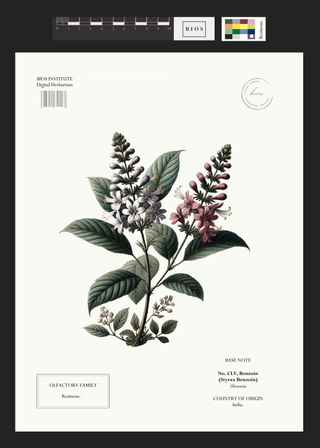

Benzoin is a resinous material derived from the bark of certain tree species, primarily the Styrax trees. It is widely used in perfumery for its rich, warm, and sweet aroma. Styrax benzoin, commonly known as benzoin resin or gum benzoin, is native to the island of Sumatra in Indonesia. It is specifically found in the regions of Sumatra, Java, and Thailand, but is also found in other parts of Southeast Asia, including India where we source ours from. Benzoin resin has been used in traditional Indian medicine systems, such as Ayurveda, and it is known as "Sambrani" in India. The benzoin tree (Styrax spp.) is cultivated for its aromatic resin, which is harvested from the bark of the tree. The resin is then used in various applications, including perfumery, incense, and traditional medicine.
Benzoin has a distinctive and complex scent that is often described as warm, vanilla-like, balsamic, and slightly spicy. It has sweet and resinous undertones with hints of caramel, honey, and cinnamon. The scent of benzoin is comforting, soothing, and has a cozy, "snuggly" quality.
In perfumery, benzoin is a fixative and base note, found in our Resinous family. It helps to enhance the longevity and depth of a fragrance, providing a stable foundation for other aromatic ingredients. The balsamic and resinous character of benzoin adds a smooth and velvety texture to perfumes.
Benzoin blends harmoniously with a wide range of other fragrance ingredients, making it a versatile component in perfume compositions. It pairs well with floral notes, such as rose and jasmine, as well as with woody accords, spices, and oriental compositions. It adds a warm and enveloping aspect to fragrances.
The warm and sweet aroma of benzoin is often associated with feelings of comfort, relaxation, and indulgence. It has a soothing and calming effect, creating a sense of warmth and well-being. Benzoin's sensuous and enveloping quality makes it a popular choice for cozy and intimate fragrances.
Benzoin's warm and sweet scent is often associated with nostalgic memories and a sense of familiarity. It can evoke feelings of comfort and nostalgia, reminiscent of cozy moments, childhood, or sentimental experiences.
Overall, benzoin is a cherished ingredient in perfumery, valued for its warm, sweet, and resinous aroma. Its comforting and sensuous qualities make it a popular choice for creating intimate, cozy, and nostalgic fragrances. Additionally, benzoin carries cultural and historical significance, having been used in traditional medicine and rituals in various cultures for centuries.
Benzoin has been used in religious and spiritual rituals in various cultures. In some traditions, the aromatic smoke produced by burning benzoin resin is believed to purify and cleanse the space, ward off negative energies, and create a sacred atmosphere. It is often used as an offering to deities or as part of meditation practices.
Benzoin has a long history of use in traditional medicine systems, including Ayurveda and Chinese medicine. It is believed to have various healing properties, such as anti-inflammatory, antiseptic, and expectorant effects. Benzoin resin has been used topically for treating skin conditions, as well as in herbal preparations for respiratory issues and digestive disorders.
Benzoin resin is associated with symbolism related to purification, protection, and spiritual connection. Its warm and comforting aroma is believed to help create a sacred and harmonious atmosphere, enhancing spiritual practices and promoting a sense of tranquility and well-being.
Benzoin has been used in cultural practices and traditions across different regions. For example, in some Asian cultures, it is incorporated into incense blends and burned during important ceremonies, festivals, and ancestral rites. It is also used in traditional crafts, such as making incense sticks, perfumes, and scented oils.
Benzoin has a rich historical significance, particularly in the trade routes of the ancient world. It was highly valued and sought after as a precious commodity, often used as incense, perfume, and medicine. Its trade and usage spanned across Asia, the Middle East, and Europe, leaving a cultural impact on these regions.
Benzoin
- Unit price
- /per
Please note this product format is a small vial that contains roughly 20 drops of scent concentrate. This can be purchased à la carte but is intended to be used with our Perfume Kit.
SCENT SPECIFICATIONS
Latin Name: Styrax Benzoin
Extraction Method: Solvent Extracted
Country of Origin: India
All of the scents in our library are naturally derived - our collection includes essential oils, absolutes, concretes, isolates, enfleurage, macerations, oleoresins, and mixed medium naturals.
Adding product to your cart
Benzoin is a resinous material derived from the bark of certain tree species, primarily the Styrax trees. It is widely used in perfumery for its rich, warm, and sweet aroma. Styrax benzoin, commonly known as benzoin resin or gum benzoin, is native to the island of Sumatra in Indonesia. It is specifically found in the regions of Sumatra, Java, and Thailand, but is also found in other parts of Southeast Asia, including India where we source ours from. Benzoin resin has been used in traditional Indian medicine systems, such as Ayurveda, and it is known as "Sambrani" in India. The benzoin tree (Styrax spp.) is cultivated for its aromatic resin, which is harvested from the bark of the tree. The resin is then used in various applications, including perfumery, incense, and traditional medicine.
Benzoin has a distinctive and complex scent that is often described as warm, vanilla-like, balsamic, and slightly spicy. It has sweet and resinous undertones with hints of caramel, honey, and cinnamon. The scent of benzoin is comforting, soothing, and has a cozy, "snuggly" quality.
In perfumery, benzoin is a fixative and base note, found in our Resinous family. It helps to enhance the longevity and depth of a fragrance, providing a stable foundation for other aromatic ingredients. The balsamic and resinous character of benzoin adds a smooth and velvety texture to perfumes.
Benzoin blends harmoniously with a wide range of other fragrance ingredients, making it a versatile component in perfume compositions. It pairs well with floral notes, such as rose and jasmine, as well as with woody accords, spices, and oriental compositions. It adds a warm and enveloping aspect to fragrances.
The warm and sweet aroma of benzoin is often associated with feelings of comfort, relaxation, and indulgence. It has a soothing and calming effect, creating a sense of warmth and well-being. Benzoin's sensuous and enveloping quality makes it a popular choice for cozy and intimate fragrances.
Benzoin's warm and sweet scent is often associated with nostalgic memories and a sense of familiarity. It can evoke feelings of comfort and nostalgia, reminiscent of cozy moments, childhood, or sentimental experiences.
Overall, benzoin is a cherished ingredient in perfumery, valued for its warm, sweet, and resinous aroma. Its comforting and sensuous qualities make it a popular choice for creating intimate, cozy, and nostalgic fragrances. Additionally, benzoin carries cultural and historical significance, having been used in traditional medicine and rituals in various cultures for centuries.
Benzoin has been used in religious and spiritual rituals in various cultures. In some traditions, the aromatic smoke produced by burning benzoin resin is believed to purify and cleanse the space, ward off negative energies, and create a sacred atmosphere. It is often used as an offering to deities or as part of meditation practices.
Benzoin has a long history of use in traditional medicine systems, including Ayurveda and Chinese medicine. It is believed to have various healing properties, such as anti-inflammatory, antiseptic, and expectorant effects. Benzoin resin has been used topically for treating skin conditions, as well as in herbal preparations for respiratory issues and digestive disorders.
Benzoin resin is associated with symbolism related to purification, protection, and spiritual connection. Its warm and comforting aroma is believed to help create a sacred and harmonious atmosphere, enhancing spiritual practices and promoting a sense of tranquility and well-being.
Benzoin has been used in cultural practices and traditions across different regions. For example, in some Asian cultures, it is incorporated into incense blends and burned during important ceremonies, festivals, and ancestral rites. It is also used in traditional crafts, such as making incense sticks, perfumes, and scented oils.
Benzoin has a rich historical significance, particularly in the trade routes of the ancient world. It was highly valued and sought after as a precious commodity, often used as incense, perfume, and medicine. Its trade and usage spanned across Asia, the Middle East, and Europe, leaving a cultural impact on these regions.
